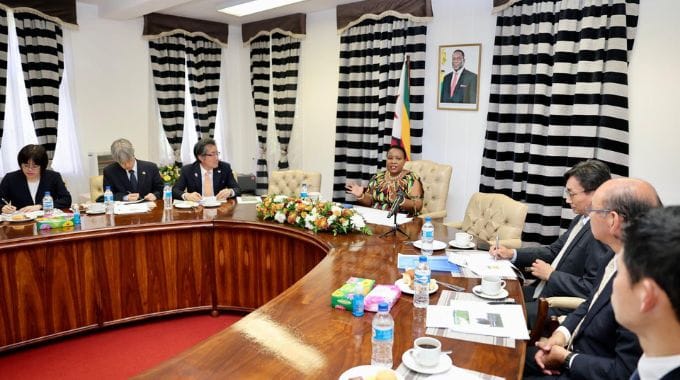First Lady’s Initiative Boosts Rice Farming in Zimbabwe
Tendai Rupapa
Japan through its International Cooperation Agency (JICA) has expanded its New Rice for Africa (Nerica) production sites in Zimbabwe, which were secured by Agric4She patron First Lady Dr Auxillia Mnangagwa during her 2022 visit to Japan.
Currently, there are 28 sites in several provinces across the country where the production of Nerica is taking place, fulfilling Dr Mnangagwa’s dream for Zimbabwe to produce rice on a large scale to reduce reliance on imports and improve food security.
This was revealed when Japanese Ambassador to Zimbabwe Mr Shinichi Yamanaka, the JICA resident representative Mr Shigeki Furuta, and other Japanese officials paid a courtesy call on the First Lady at her offices yesterday.
They expressed confidence in Zimbabwe’s agricultural sector, especially the Agric4She programme, saying they intended to partner Dr Mnangagwa in sesame production under the programme supporting female farmers particularly in drought-prone areas, with a focus on exporting the crop to Japan.
The delegation also expressed its keen interest to partner the First Lady in the health sector, education, cultural heritage, tourism, and women empowerment.
Ambassador Yamanaka said Amai Mnangagwa was an inspiration through her sterling work in the mentioned areas.
Nerica rice is a disease- and drought-resistant African-Asian hybrid.
In 2022, Dr Mnangagwa attended the Asia Pacific Africa Women’s Economic Exchange Summit in Japan, which explored ways of securing food self-sufficiency.
It is during this conference that Dr Tatsushi Tsuboi, an expert in rice production, made a presentation on Nerica production in African countries and how women were playing an active role in its production.
Zimbabwe, however, was not mentioned as a beneficiary of the rice production prompting Amai Mnangagwa to hold side meetings with Dr Tsuboi and other JICA senior officials, during which she requested Nerica rice production initiatives in Zimbabwe.
The following year, she invited Dr Tsuboi to Zimbabwe to lay the groundwork for large-scale rice production.
When the experts came, Dr Mnangagwa roped in the Ministry of Lands, Agriculture, Fisheries, Water and Rural Development to make the rice venture possible.
Today, Zimbabwe is reaping huge benefits from the First Lady’s hard work.
The ambassador informed the First Lady on the current position of Nerica production.
“We are glad to inform you your Excellency that our cooperation for Nerica rice cultivation is expanding. We have come to explain to you the current situation which Mr Shigeki Furuta will explain further. We have also come to discuss with you on other areas of collaboration,” he said.
He mentioned that he was focused on the cooperation for the production of sesame seed in Zimbabwe, assuming the export to Japan.
“Besides rice cultivation, Japan is also focusing on other areas to support agriculture in Zimbabwe, for example, Sesame seed production. Sesame is not so popular among Zimbabwean people, but it’s very important for Japanese cuisine, including sesame oil. Sesame is essential food in Japan. The Japanese trading company is interested in exporting Zimbabwe’s sesame to Japan. It started exports last year and we are expecting to expand the volume. Japan is also supporting the production of the seed. Besides collaboration in agriculture, we also intend to work with you by providing support in the areas of health, education, and gender,” he said.
He expressed his willingness to work with the Angel of Hope Foundation’s patron in various areas, including women empowerment.
“There are possibilities for us to work with the First Lady and women under her Agric4she programme in sesame production and horticulture to empower the women. Also, we are going to cooperate in the education sector, such as setting up elementary school for culture exchange,” he said.
The Ambassador also extended an invitation to the First Lady for her to participate at the Osaka Expo to be held in Japan this year.
“Culture exchange is important. We are pleased that pop culture is getting popular in Zimbabwe, such as the manga and anime. At the Osaka Expo, it will be a very good chance and occasion to expand our mutual understanding between our two countries.
It is also important to let Japanese people know about the Zimbabwean culture, such as its sculptures and traditional music and instruments like mbira,” he said
Mr Furuta shed more light on the expansion of Nerica rice production sites across the country.
“Following the First Lady’s request for rice cultivation in Zimbabwe, as Jica, we responded to that request. Dr Tsuboi visited three times last year, and now we have two rice experts working in Zimbabwe for the expansion of the rice production. Nerica is good for climate in Zimbabwe, and it grows very well. Together with the farmers, we are very excited to expand the production sites. We gradually expanded the production of the seeds.
“We are hopeful that soon the size of the production will grow on a large scale. We are also working on mechanisation research for post harvest,” he said.
The First Lady, who is already promoting women’s participation in the agriculture value chain, expressed gratitude to Japanese delegates for expanding the NERICA rice project across the country.
She also welcomed the idea of Zimbabwean women producing sesame seed for export to Japan, indicating that the involvement of women will yield positive outcomes since women are the backbone of any society.
“When I visited Tokyo for the Women Economic Exchange Summit, i had meetings with rice experts and JICA officials and made a humble plea for rice production in Zimbabwe. I want to thank JICA for giving us rice experts to continue with this programme of Nerica production in Zimbabwe.
“The meetings that I had at that time came to fruition, and I am grateful. Dr Tsuboi came here many times doing soil research to see if it was suitable for the rice production.
“In April 2024, we went to Manicaland, Marange area, where we harvested the first crop with Dr Tsuboi. We harvested more than expected. Dr Tsuboi taught us how to cut the rice and the equipment to use. So I am so grateful that this programme is continuing,” she said.
Amai Mnangagwa also welcomed the partnership in the mentioned sectors.
Dr Mnangagwa, who is the country’s tourism patron, noted that cultural exchange programmes between Japan and Zimbabwe were key in the growth of the tourism sector.
“I am also the patron of culture and heritage in the Ministry of Primary and Secondary education. I am also thinking if we can collaborate and have a school here in Zimbabwe so that our children get to know the Japanese culture and it becomes an exchange programme. This will be a twinning arrangement. Culture exchange programmes can be very beneficial for tourism, fostering sustainable and enriching travel experiences by promoting deeper engagement with local cultures and communities. It also allows tourists to immerse themselves in different cultures, traditions, and lifestyles. We have many tourist sites in Zimbabwe,” she said.
Amai Mnangagwa further spoke about her Agric4she programme and how it is economically empowering women countrywide. She welcomed the sesame seed production.
“I am the Agric4She patron, and i am excited that we can collaborate in sesame seed production. This will benefit our women in Zimbabwe. Our women are hard workers. If you give them something to do, they will bring results,” she said.
The country’s annual rice demand is 300 000 metric tonnes, but local production remains low at only 2 900 metric tonnes from traditional rice varieties. Therefore, the expansion of Nerica is a game changer. – Herald

